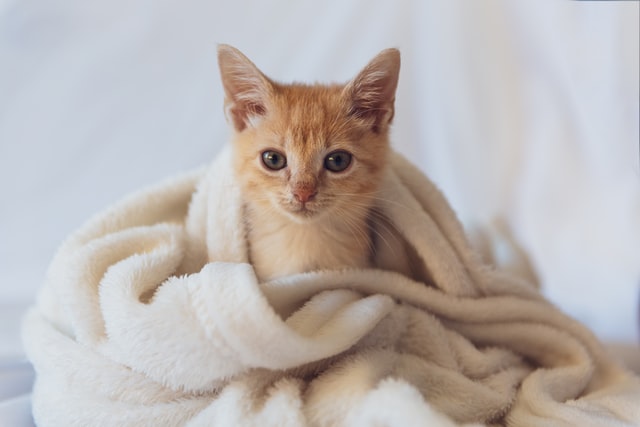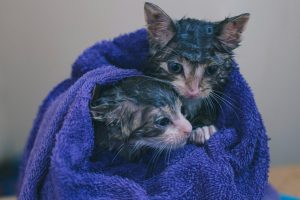We understand that adopting a kitten is a big decision and comes with lots of questions. At the first appointment with your new baby, we will help guide you to make decisions for their health. The technician will be available to you to answer your questions and offer you good advice.
This document will show you the difference options for your pet and to help you prepare any questions you might have for the technician during the telephone appointment.
Vaccines:
- RCP (base): Vaccine that protects against several viruses transmitted by other infected cats. These are the 3 viruses included in the vaccine: Rhinotracheitis, Calicivirus and Panleukopenia. The protection against these viruses are very important for kittens as they can have severe symptoms to these viruses. Panleukopenia is very dangerous and too often results in death.
- (This vaccine is obligatory for the surgery)
- Leukaemia: Is a serious virus that we will see more often in cats that go outdoors. It is important to vaccinate your kitten against this virus if you plan on letting them go outside.
- Rabies: Rabies is transmitted in the saliva of infected animals directly with the blood stream of another animal. It can be transmitted through bites or licking of a wound. The animals that are carriers of rabies are raccoons, bats, foxes and skunks, which are animals that live even in cities. This illness is very serious, there is no cure for it and it is deadly in all cases. Most importantly it is zoonotic (can be transmitted to humans).
Test FIV/FELV:
- FIV (feline AIDS) and FeLV (feline leukaemia) are viruses (not contagious to humans) that attack the immune system in cats. These viruses are very contagious, weakening their immune systems and eventually lead to death. FIV is mainly transmitted by bites from infected cats, whereas, FeLV is mainly transmitted through grooming by an infected cat or contact with urine from the infected cat. The virus can also be transmitted to kittens by an infected mother.
- Some cats can carry the viruses and be asymptomatic. Therefore, we recommend to test your new pet for these viruses. The test is done by taking a small blood sample, both viruses are checked simultaneously.
Parasite Prevention:
- We recommend parasite prevention in kittens up to 6 months of age because young animals are often infested with parasites. Even if you don’t see worms in the stools. Parasites can be transmitted by infested mothers through the placenta or during lactation.
- We also recommend to do a fecal analysis in your kitten to be able to identify the parasites, if any, to be able to chose a specific de-wormer. However, even if the fecal test is negative – meaning no parasite ova were found – it does not mean that there are no intestinal parasites, it could be that the parasite has not laid eggs at the moment the stool sample was taken. This is why we recommend to deworm regardless of the fecal analysis results.
- When the technician calls you for the telephone consult, it is important to let her know if your new kitten will be going outside or will be strictly and indoor cat as the parasite prevention protocol depends on that. It mainly affects if we will give a product to prevent external parasites such as fleas, but also internal parasite prevention for cats who hunt.
General care:
- Cats are very clean animals and will clean themselves. It is therefore unnecessary to bathe your cat. Most don’t like water and forcing them to bathe can be very stressful and detrimental to their health.
- However, if you need to bathe your kitten – because sometimes they get dirty – it is advised to use a warm damp cloth with a shampoo made for cats.
- Make sure to wipe out the shampoo completely as cats will groom themselves and will ingest the shampoo.
- Some rare cats love water and will climb into the shower, if this is your cat, that’s perfectly fine as long as they choose it!
Ears:
- The ears must be cleaned as needed. The frequency of the cleaning depends on the wax production of each individual animal.
- When cleaning your cat’s ears, it is important to use a pet ear cleaning solution. An explicative pamphlet with drawings will be given to you on your first visit to show you how to clean the ears. You can also check out our video demonstrating how to clean the ears on our website.
- It is important to manipulate sensitive areas on your pet to acclimate them to touch. These areas include the ears, mouth and paws. If your cat is used to being touched in the areas, it will make manipulations like nail trims and ear cleaning easier for you to do. It will also make the vet exams go better too!
Teeth:
- Cat’s teeth, like humans, should be brushed every day.
- As cats cannot spit, it is mandatory to use a toothpaste made for animals as it does not contain fluoride which is toxic if ingested.
- Brushing the teeth daily can prevent periodontal disease and expensive vet bills for dental procedure. It also prevents living with a painful mouth, and eventual necessary painful extractions.
- A video on our Youtube channel shows you exactly how to introduce teeth brushing to your kitten.
Nail trims:
- You will find a video explaining step by step how to cut your cat’s nails.
- It is important to go slowly with your kitten to get them used to nail trims always respecting their limits.
- Make the experience as positive as possible by giving lots of treats!
The Bellerive Team


